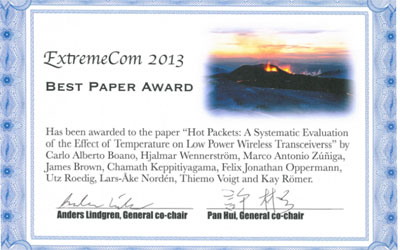Recent Stories
- Businesses urged to tap into science and technology young talent
- Digital relay baton enables remote crowd cheering of athletes
- Health Innovation Campus moves a step closer
- £7.1 million R&D boost for North West businesses
- Centre of excellence created for the next industrial revolution
- Artificial intelligence toolkit spots new child sexual abuse media online
- Strategic partnership set to help plug cyber security skills gap
- What your choice of smartphone says about you
- InfoLabTree: Discover the Story
- novi.digital Launch Event - 'An Event to Help Businesses Grow Online'
RSS Feeds
RSS feeds can deliver the latest InfoLab21 news and events direct to your browser without you having to visit the website.
In most browsers you can click on an RSS link and choose to subscribe to the feed to add it to your favourites or bookmarks.
Best Paper Award at the ExtremeCom 2013 Conference

A paper written by researchers including Dr James Brown and Dr Utz Roedig from the School of Computing and Communications has received the best paper award at the ExtremeCom 2013 conference in Iceland.
The paper, entitled "Hot Packets: A Systematic Evaluation of the Effect of Temperature on Low Power Wireless Transceivers", looks at the effect of temperature on the performance of radio transceivers, and is part of the ongoing research towards building reliable Smart Cities and the Internet of Things (IoT).
Daily or hourly changes in temperature can dramatically reduce the performance of communication links, or even lead to network failure. The higher the temperature, the lower the quality of links. This paper represents an initial stepping stone aimed at predicting the performance of a network by considering the particular temperature profile of a given environment.
Dr Utz Roedig is Principle Investigator on the School of Computing and Communications' project FP7:RELYONIT which is providing the tools to enable dependable IoT (Internet of Things) applications by taking into account all relevant environmental properties and their impact on communications.
The IoT will enable online applications of utmost societal value including smart cities, smart grids, and smart healthcare. However, most of these applications pose strict dependability requirements on IoT performance: sensor data and actuation commands must be delivered reliably and timely while batteries powering devices must last for a given time in the order of years. Failure to meet these requirements may result in risks for humans and infrastructures, insufficient user satisfaction, and high costs. Existing IoT solutions do not provide dependable performance. A major reason for this is that embedded wireless sensors and actuators are deeply affected by their often hostile environment. Radio interference from other wireless equipment and electrical appliances impairs communication, temperature and humidity variations affect battery capacity and electronics.
Wed 09 October 2013
Associated Links
- Dr James Brown - Research portal
- Dr Utz Roedig - Research portal



